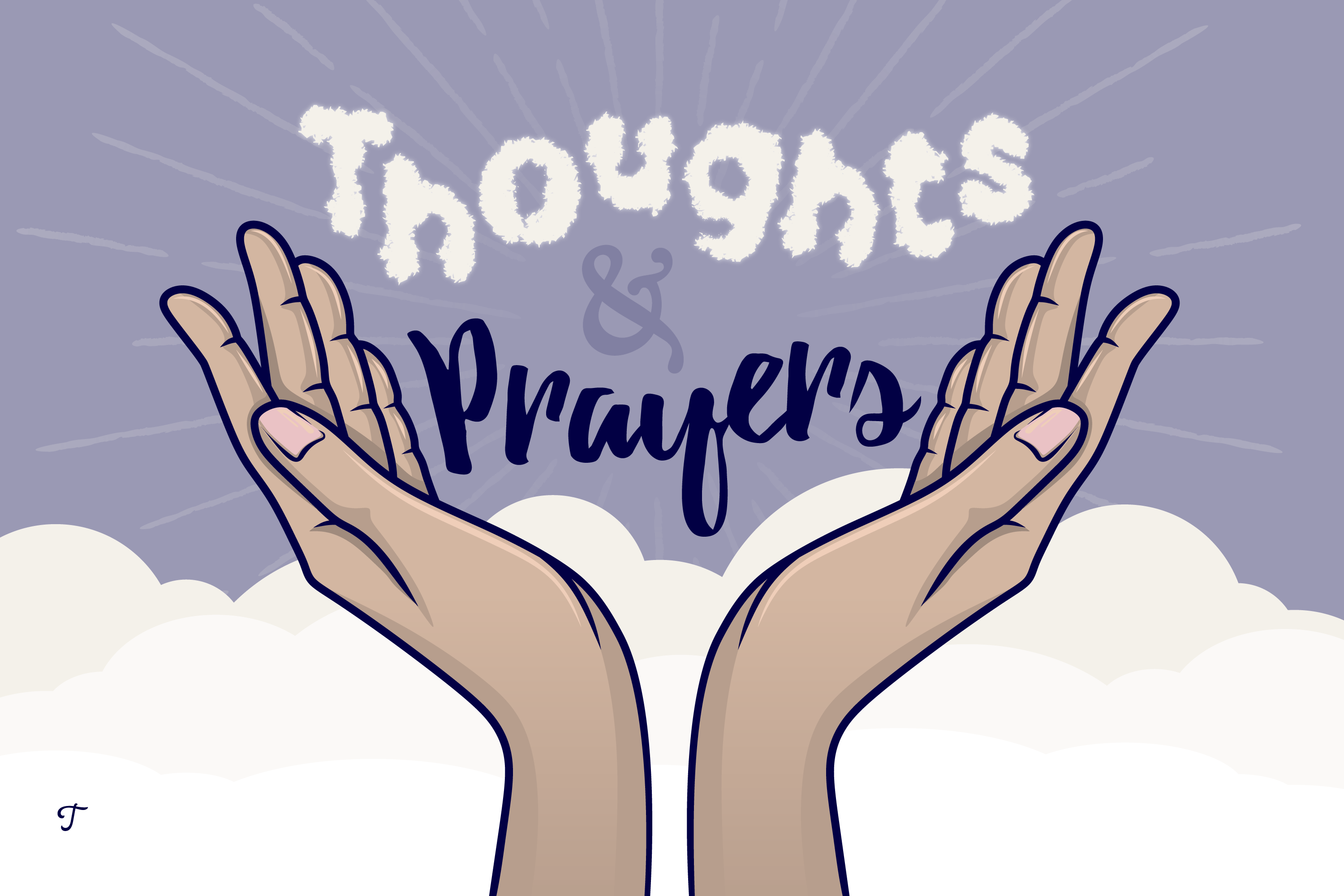
Articles
Are 'Thoughts and Prayers' Appropriate at Work?
July 18, 2022

Raise your hand if you’ve seen at least one person offer their “thoughts and prayer” on social media lately.

Escalating distaste and dark humor around the phase have grown right alongside our need to use it. For people suffering, “thoughts and prayers” solves nothing. Yet, tragedy after tragedy, we see it circulating throughout our feeds and lives.
Heartache and struggle are everywhere — even at work. Which raises the question: Are “thoughts and prayers” appropriate in a work setting? We polled our team here at Trainual and found that, of those surveyed, 40% have used the phrase at work, and 60% have used it outside of work.
And when asked, “what’s your gut reaction to the phrase,” the general consensus was that it offered less than “meh” vibes.
- “Kinda feels like something people would say when they don't care.”
- “The person saying this phrase isn't interested in helping beyond expressing their sympathy on the matter.”
- “I think it really means well, just has gotten to be a bit of a blanket response when something bad happens. I think due to the frequency of bad things happening, it's really lost its true sincere meaning.”
- “No strong emotion. To me, it is equivalent to ‘I am thinking of…’”
- “I think it's a thing people say because it's a social norm to say it. But, I feel like in most cases there's not a lot of actual empathy behind it.”
So, what can we (business owners, colleagues, co-workers and friends) do to comfort those in need of our support during hard times instead of offering an empty (or seemingly empty) thought and prayer?
First, let’s backup a bit and figure out what this popular phrase actually means.
And, does it mean anything at all?
It depends on who you ask.
From a secular viewpoint, the phrase:
- Expresses indifference in the face of tragedy.
- Is void of action.
- Is completely hollow and offensive.
From a non-secular viewpoint, the phrase is:
- Full of hope.
- Positive and loving.
- A form of meditation.

Yikes. These views couldn’t be more different from one another. In fact, using the phrase over and over isn’t bringing us closer together — it's pulling us further apart.
What about using the phrase at work?
Well, LinkedIn says it's a straight up trap. They suggest we understand our audiences and “if your company is doing something to help or support the individuals affected by a tragedy, that's great.”
That’s right in line with one of our respondents who said, “I think it depends on the situation. Sometimes there isn't much that you are able to do, so offering to keep someone in your thoughts and prayers is appropriate. Sometimes, that is not enough. You can donate (your time/money), offer to volunteer, or just be proactive in trying to help a friend or a coworker if something has happened to them (sending a gift card for meals, offering to take projects off their plate, etc.).”
There’s the golden ticket. Know what is required of you as an employer and what truly helps your people.
The fine print
First things first, when it comes to workplace religious accommodations, employers are required to allow “an employee's sincerely held religious beliefs or practices” (such as prayer). So, banning the phrase (or banning the offering of a prayer) is a big no-no.
But there are certainly tipping points. A prayer is one thing, but preaching, trying to convert someone to a new religion, or infringing on someone’s space can be considered harassment.
We recommend employers include their unbiased viewpoint in their Harassment Policy. (Need one? Check out our harassment policy template.)
Now that the required stuff is out of the way, let's take a look at what you can do (in addition to your required policies) to support and uplift your people when it matters most — without using “thoughts and prayers.”
4 Things you Can Do in Place of "Thoughts and Prayers"
1. Talk about it with your people.
When tragic things occur outside of work, it still impacts the people at work. So, instead of pretending that nothing is happening (or regurgitating the same ol’ phrase) — face it! Acknowledge the pain and take a stance. Even if there are ‘still a lot of questions to answer.’ Your acknowledgement of the situation lets your team know that they are not alone.
2. Then, don’t just talk about it, be about it.
Establish a workplace support group in your company that can uplift fellow team members in the face of tragedy or struggle.
Special message to the business owners out there: This does not mean you need to wear yet another hat.
Instead, form a volunteer group made up of your people and POPs (AKA people operations) team. At Trainual, we’ve done this through a group called Cheerios.

Cheerios is a volunteer group of employees that commit to meet, connect, and rally together to support each other and the team. One of the primary objectives of Cheerios is to “identify team members who may be struggling, going through a hard time, or just need a little extra lovin’.”
During dark times, your Cheerios group can empower other group leaders (like affinity groups) to connect with teammates and check in.
They can also:
- Coordinate meals.
- Send gift cards.
- Send hand-written notes.
- Make house calls.
- Offer to help.
3. Create safe spaces.
Like affinity groups, where people can talk about how things are affecting them.
Affinity groups are work communities within your company that are made up of (and for) people who share at least one aspect of their identity. That way, you give your team a sense of belonging and a place where they can comfortably express themselves.
The shared identity allows people to feel safe. So, in the face of tragedy, leverage your affinity group leaders to check in with their fellow members.
Just knowing that someone is “here for you” can be a step in the right direction.

4. Encourage alternative language.
The good news is that there’s a lot more we can say. Using your company’s inclusive vocabulary guide, offer your team some alternative phrases to “thoughts and prayers.”
Check out what some of the Trainual team suggests:
- How’s your heart?
- Want to get together and listen to your favorite Spotify playlist?
- Thinking of you. 💜 You are on my heart.
- Sending you so much love. 💜
- I'd be happy to support you in whatever way is needed during this time.
- We cannot imagine what you are experiencing, but we are here to listen if you need to talk.
- Tell us how we can support you during this difficult time.
- I'm here for you, however you need me.
- Sending good thoughts/vibes your way.
- I am thinking of you and sending my love/best wishes.
- My deepest condolences. I am here if you need anything or if you need a sounding board.
- Please know that you are not alone and have a support system on standby.
- I heard [tragic event] happened, can I bring you dinner? (Keep it actionable.)
- Can I bring/order your family dinner tonight so that you don't have to worry about cooking?
- Can I help watch your children while you attend that doctor's appointment or if you just need a moment to yourself?
- What charity can I donate money to in your name?
- Surrounding you and your family with healing hugs and good energy during this unspeakably difficult time.
During moments of suffering and tragedy, offer your people more than words. Offer them your presence, your help, your support, and your time. We know work is busy. So don’t leave this important need to chance. Build the foundation of support with intentionality and implement it consistently. Your people will be all the better for it.
Similar Blog Posts











